
Background Check Group
+6531 290 390
Email: info@backcheckgroup.com
Background Check Group
Global Reach Local Insight Headquartered in Singapore serve clients in more than 200 countries
Culture and Engagement
Survey Details
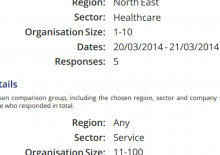
Culture and Engagement allows you to compare your results to other organizations, and to your own past surveys. To allow you to put the information in context, survey details are provided regarding the number of people who took part, the dates over which they completed it, the region of area where the survey took place, the sector of the workforce involved and the size of the organization participating. This information is also provided for any comparison groups you choose to include in the survey, and your own past survey results.
Biographical Questions

Biographical questions enable you to gather factual information that describes the participants who have been asked to take part in the survey. We provide a default range of demographical questions, but this section can be tailored to include any information that you would like to collect. Questions can be single or multiple choice, voluntary or compulsory and can all be used to further analyse the results gathered from the Culture and Values, and Employee Engagement sections of the survey.
Culture and Values
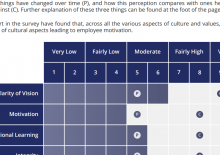
The culture, values and level of employee engagement within an organization are widely acknowledged as having key influences on its performance and effectiveness. These influences can be both positive and negative, and may impact on both harder quantitative aspects of organizational performance (e.g. productivity, profitability) and softer qualitative aspects (e.g. staff morale, motivation and teamwork). The culture and values section of the survey looks at how an organization is perceived by measuring a selection of scales including clarity of vision, motivation, organizational learning, integrity, team work, customer focus, diversity, staff development, quality, innovation, business focus and autonomy.
Employee Engagement
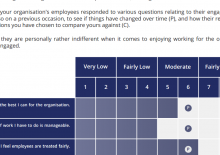
While the culture and values section addressed how an organization's employees perceive its culture, the Employee Engagement section relates to their personal feelings about the organization; how they feel about it, and how they engage with it. It is one thing to have a clear view about what goes on in an organization, but this section gets to the heart of what impact this has on its employees, and what it means to them to be working for it. While Research indicates that organizations with satisfied employees are more productive - it's a clear case of documented findings matching common sense. If employees are disengaged, then an organization is likely to be faced with difficulty in recruiting good people and keeping hold of its talented ones. They say a reputation can take a lifetime to build up but can be destroyed in an instant and this is just as true of an organization as it is of a person.
Biographical Splits
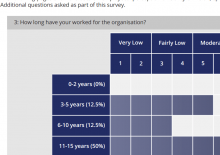
Sometimes it is necessary to understand how different demographic groups perceive your organization in a variety of ways. Using the biographical questions asked at the start of the survey you can use the Culture and Engagement tool to find out how the perception of your organization varies by department, region, specialism or any other questions you choose to ask.
Respondent Comments
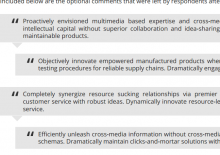
Sometimes a survey will not discuss all of the topics that a participant may want to address. Whenever a participant is asked to complete a Culture and Engagement survey, they are asked to provide some follow up comments that relate to the feedback they have provided as part of the survey itself or that they feel need to be raised or included as part of the Culture and Engagement process. Ensuring that participants are able to provide comments ensures that voices are heard, views are acknowledged and insights are valued.

 We will not leak your personal information
We will not leak your personal information